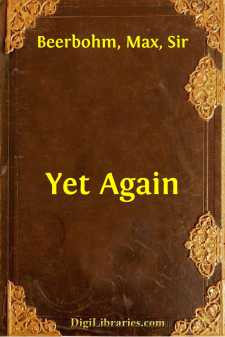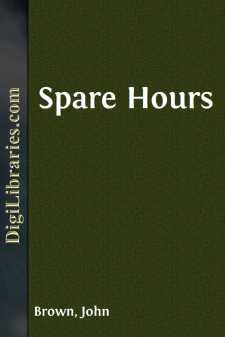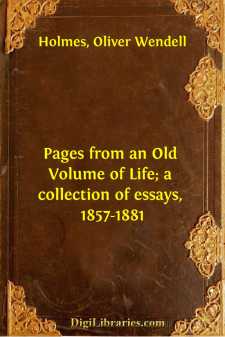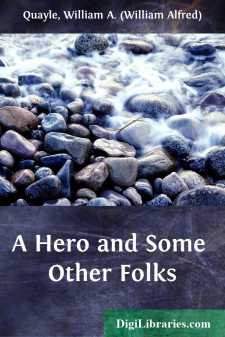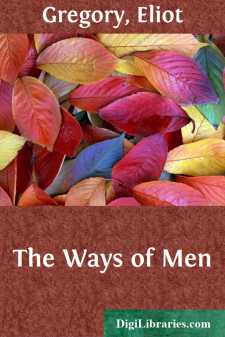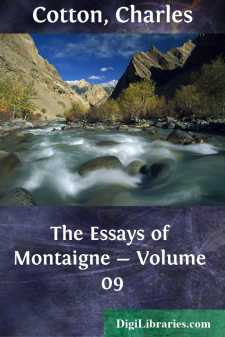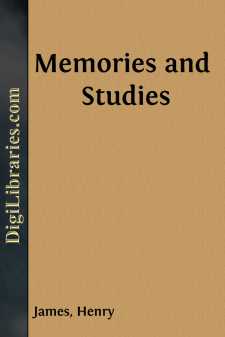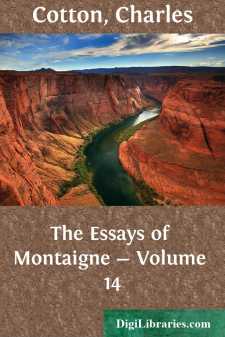Literary Collections
- American 84
- Ancient, Classical & Medieval 14
- Asian 1
- Australian & Oceanian 1
- Canadian 55
- Continental European 121
- English, Irish, Scottish, Welsh 179
- Essays
- General 24
- Letters 46
- Middle Eastern 1
Essays Books
Sort by:
by:
Max Beerbohm
THE FIRE If I were 'seeing over' a house, and found in every room an iron cage let into the wall, and were told by the caretaker that these cages were for me to keep lions in, I think I should open my eyes rather wide. Yet nothing seems to me more natural than a fire in the grate. Doubtless, when I began to walk, one of my first excursions was to the fender, that I might gaze more nearly at...
more...
by:
John Brown
NOTE TO THE AMERICAN EDITION. The author of “Rab and his Friends” scarcely needs an introduction to American readers. By this time many have learned to agree with a writer in the “North British Review” that “Rab” is, all things considered, the most perfect prose narrative since Lamb’s “Rosamond Gray.” A new world of doctors, clergymen, shepherds, and carriers is revealed in the...
more...
BREAD AND THE NEWSPAPER. (September, 1861.) This is the new version of the Panem et Circenses of the Roman populace. It is our ultimatum, as that was theirs. They must have something to eat, and the circus-shows to look at. We must have something to eat, and the papers to read. Everything else we can give up. If we are rich, we can lay down our carriages, stay away from Newport or Saratoga, and adjourn...
more...
Jean Valjean The hero is not a luxury, but a necessity. We can no more do without him than we can do without the sky. Every best man and woman is at heart a hero-worshiper. Emerson acutely remarks that all men admire Napoleon because he was themselves in possibility. They were in miniature what he was developed. For a like though nobler reason, all men love heroes. They are ourselves grown tall,...
more...
by:
Eliot Gregory
CHAPTER 1—“Uncle Sam” The gentleman who graced the gubernatorial armchair of our state when this century was born happened to be an admirer of classic lore and the sonorous names of antiquity. It is owing to his weakness in bestowing pompous cognomens on our embryo towns and villages that to-day names like Utica, Syracuse, and Ithaca, instead of evoking visions of historic pomp and circumstance,...
more...
THE SPIRIT OF PLACE With mimicry, with praises, with echoes, or with answers, the poets have all but outsung the bells. The inarticulate bell has found too much interpretation, too many rhymes professing to close with her inaccessible utterance, and to agree with her remote tongue. The bell, like the bird, is a musician pestered with literature. To the bell, moreover, men do actual violence. You...
more...
by:
Charles Cotton
CHAPTER I OF THE INCONSTANCY OF OUR ACTIONS Such as make it their business to oversee human actions, do not find themselves in anything so much perplexed as to reconcile them and bring them into the world's eye with the same lustre and reputation; for they commonly so strangely contradict one another that it seems impossible they should proceed from one and the same person. We find the younger...
more...
by:
Henry James
LOUIS AGASSIZ[1] It would be unnatural to have such an assemblage as this meet in the Museum and Faculty Room of this University and yet have no public word spoken in honor of a name which must be silently present to the minds of all our visitors. At some near future day, it is to be hoped some one of you who is well acquainted with Agassiz's scientific career will discourse here concerning...
more...
by:
Charles Cotton
CHAPTER I OF PROFIT AND HONESTY No man is free from speaking foolish things; but the worst on't is, when a man labours to play the fool: "Nae iste magno conatu magnas nugas dixerit." ["Truly he, with a great effort will shortly say a mighty trifle." —-Terence, Heaut., act iii., s. 4.] This does not concern me; mine slip from me with as little care as they are...
more...
by:
Oscar Wilde
HOW THEY STRUCK A CONTEMPORARY There is such a thing as robbing a story of its reality by trying to make it too true, and The Black Arrow is so inartistic as not to contain a single anachronism to boast of, while the transformation of Dr. Jekyll reads dangerously like an experiment out of the Lancet. As for Mr. Rider Haggard, who really has, or had once, the makings of a perfectly magnificent liar,...
more...


